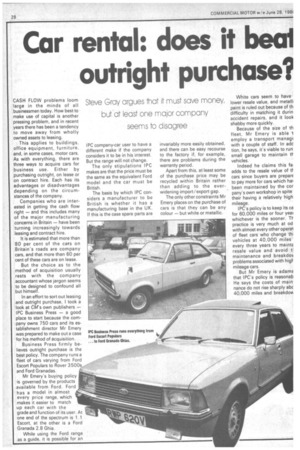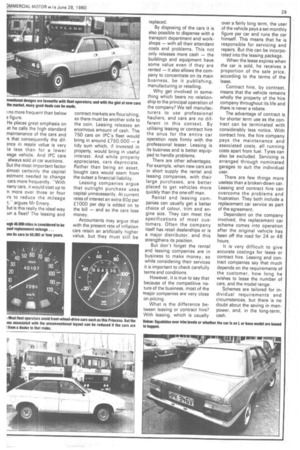Car rental: does it bed outright purchase?
Page 30

Page 31

If you've noticed an error in this article please click here to report it so we can fix it.
CASH FLOW problems loom large in the minds of all businessmen today. How best to make use of capital is another pressing problem, and in recent years there has been a tendency to move away from wholly owned assets to leasing.
This applies to buildings, office equipment, furniture, and, in some cases, motor cars. As with everything, there are three ways to acquire cars for business use. Either by purchasing outright, on lease or on contract hire. Each has its advantages or disadvantages depending on the circumstances of the company.
Companies who are interested in getting the cash flow right — and this includes many of the major manufacturing concerns in Britain — have been turning increasingly towards leasing and contract hire.
It is estimated that more than 80 per cent of the cars on Britain's roads are company cars, and that more than 60 per cent of these cars are on lease.
But the choice as to the method of acquisition usually rests with the company accountant whose jargon seems to be designed to confound all but himself.
In an effort to sort out leasing and outright purchase, I took a look at CM's own publishers — 'PC Business Press — a good place to start because the company owns 750 cars and its establishment director Mr Emery was prepared to make out a case for his method of acquisition.
Business Press firmly believes outright purchase is the best policy. The company runs a fleet of cars varying from Ford Escort Populars to Rover 3500 and Ford Granadas.
Mr Emery's buying policy is governed by the products available from Ford. Ford has a model in almost every price range, which makes it easier to match up each car with the grade and function of its user. At one end of the spectrum is 1.1 Escort, at the other is a Ford Granada 2.8 Ghia.
While using the Ford range as a guide, it is possible for an IPC company-car user to have a different make if the company considers it to be in his interest. But the range will not change.
The only stipulations IPC makes are that the price must be the same as the equivalent Ford model and the car must be British.
The basis by which IPC considers a manufacturer to be British is whether it has a manufacturing base in the UK. If this is the case spare parts are
invariably more easily obtained, and there can be easy recourse to the factory if, for example, there are problems during the warranty period.
Apart from this, at least some of the purchase price may be recycled within Britain rather than adding to the everwidening import/export gap.
The only other constraints Mr Emery places on the purchase of cars is that they can be any colour — but white or metallic. White cars seem to have
lower resale value, and metalli paint is ruled out because of th
difficulty in matching it durin accident repairs, and it look shabby more quickly.
Because of the size of th fleet, Mr Emery is able 't employ a transport ma nag( with a couple of staff. In adc tion, he says, it's viable to run small garage to maintain th vehicles.
Indeed he claims this fa, adds to the resale value of tf cars since buyers are prepar€ to pay more for cars which ha■ been maintained by the cor pany's own workshop in spite their having a relatively high mileage.
IPC's policy is to keep its ca for 60,000 miles or four year whichever is the sooner. Tf practice is very much at od with almost every other operal of fleet cars who change thi vehicles at 40,000 miles every three years to mainta resale value and avoid tl maintenance and breakdov problems associated with hig' mileage cars.
But Mr Emery is adama that IPC's policy is reasonab He says the costs of main nance do not rise sharply abc 40,000 miles and breakdov% t no more frequent than below s figure.
He places great emphasis on at he calls the high standard maintenance of the cars and ,s that consequently the difance in resale value is very le less than for a lower eage vehicle. And IPC cars always sold at car auctions. But the most important factor 31most certainly the capital estment needed to change cars more frequently. "With
any cars, it would cost up to n more over three or four rrs to reduce the mileage t," argues Mr Emery.
3ut is this really the ideal way un a fleet? The leasing and
contract markets are flourishing, so there must be another side to the coin. Leasing releases an enormous amount of cash. The 750 cars on IPC's fleet would bring in around £750,000 — a tidy sum which, if invested in property, would bring in useful interest. And while property appreciates, cars depreciate. Rather than being an asset, -bought cars would seem from the outset a financial liability.
Leasing companies argue that outright purchase uses capital unnecessarily. At current rates of interest an extra 60p per £1000 per day is added on to the bill — and so the cars lose money.
Accountants may argue that with the present rate of inflation cars retain an artificially higher value, but they must still be replaced.
By disposing of the cars it is also possible to dispense with a transport department and workshops — with all their attendant costs and problems. This not only releases more cash — the buildings and equipment have some value even if they are rented — it also allows the company to concentrate on its main business, be it publishing, manufacturing or retailing.
Why get involved in something which bears no relationship to the principal operation of the company? We tell manufacturers to use professional hauliers, and cars are no different in this context. By utilising leasing or contract hire the onus for the entire car operation rests firmly with the professional leaser. Leasing is its business and is better equipped to handle problems.
There are other advantages. For example, when new cars are in short supply the rental and leasing companies, with their large purchases, are better placed to get vehicles more quickly than the one-off man.
Rental and leasing companies can usually get a better choice of colour, trim and engine size. They can meet the specifications of most customers. Often the company itself has retail dealerships or is a major distributor, and this strengthens its position.
But don't forget the rental and leasing companies are in business to make money, so while considering their services it is important to check carefully terms and conditions.
However, it is true to say that because of the competitive nature of the business, most of the /najor companies are very close on pricing.
What is the difference between leasing or contract hire? With leasing, which is usually over a fairly long term, the user of the vehicle pays a set monthly figure per car and runs the car himself. This means that he is responsible for servicing and repairs. But this can be incorporated into the leasing package.
When the lease expires when the car is sold, he receives a proportion of the sale price, according to the terms of the lease.
• Contract hire, by contrast, means that the vehicle remains wholly the property of the hire company throughout its life and there is never a rebate.
The advantage of contract is for shorter term use as the contract can be terminated with considerably less notice. With contract hire, the hire company pays the maintenance and associated costs, all running costs apart from fuel. Tyres can also be excluded. Servicing is arranged through nominated garages to suit the individual user.
There are few things more useless than a broken-down car. Leasing and contract hire can overcome the problems and frustration. They both include a replacement car service as part of the agreement.
Dependent on the company involved, the replacement car scheme comes into operation after the original vehicle has been off the road for 24 or 48 hours.
It is' very difficult to give accurate costings for lease or contract hire. Leasing and contract companies say that much depends on the requirements of the customer, how long he wishes to lease the number of cars, and the model range.
Schemes are tailored for individual requirements and circumstances, but there is no doubt about the saving in manpower, and, in the long-term, cash.




































































































































